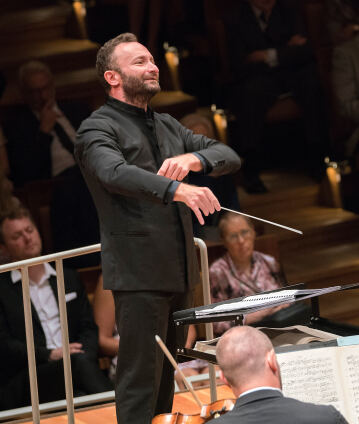Season opening 2018: Kirill Petrenko conducts Beethoven and Strauss

In a way, this concert looks ahead to a new era. One year before Kirill Petrenko took up his post as the Berliner Philharmoniker’s new chief conductor, he conducted the opening concert of the 2018/19 season. At the same time, he presented his interpretation of core works of the Philharmoniker’s repertoire: Beethoven’s Seventh Symphony and Richard Strauss’s tone poems Don Juan and Tod und Verklärung. “What was revealed in this great moment was more than the magic of a beginning. This union will bring forth great things” (Die Zeit).
At the opening of the 2018 season, Kirill Petrenko did not miss the opportunity to conduct his future orchestra – at that time still as chief conductor designate. With Richard Stauss’s two tone poems Don Juan and Tod und Verklärung, two works were on the programme which are characterised by a sophisticated, colourful and dazzling instrumentation. They are regarded as showpiece works for orchestra. Ideal for Kirill Petrenko and the Berliner Philharmoniker to unfold the full splendour of orchestral ensemble playing together.
Both works belong to the series of tone poems with which the young Richard Strauss lifted the genre of programme music to new heights and established his name as one of the leading composers of his time. Don Juan, the literary archetype of the Spanish ladies’ man, inspired countless poets and composers. Strauss impressively describes the development of the protagonist, from the impetuous, passionate womaniser to the mentally torn, life-weary man. Tod und Verklärung on the other hand, describes the last hours of a terminally ill man, his pain, his memories of better days, and finally his death. Incidentally, the Berliner Philharmoniker played both works under the direction of the composer shortly after the world premieres in Weimar in 1889 and Eisenach in 1890; as such, they are virtually part of the orchestra’s musical DNA. Strauss owed the fact that he had the opportunity to perform his tone poems in Berlin to his mentor Hans von Bülow, chief conductor of the Philharmoniker at the time. A few days before Strauss conducted his Don Juan, Bülow had already presented the work in one of the orchestra’s subscription concerts, provoking the displeasure of the self-confident composer who wrote to his parents: “So Bülow got the tempi, everything totally wrong, and has no idea of the poetic content [...].”
When Strauss wrote his two tone poems, he was at the beginning of a phenomenal career; By contrast, Ludwig van Beethoven had already reached the pinnacle of his fame when he composed his Seventh Symphony. With its optimistic, rousing and energetic spirit, it earned thundering applause from the audience at its premiere in 1813. The reviewer of the Wiener allgemeine musikalische Zeitung stated that the symphony “is so clear in every respect, so pleasing and easily comprehensible in every subject, that every music lover, without being a connoisseur, will be powerfully attracted by its beauty and burn with enthusiasm”.
© 2018 Berlin Phil Media GmbH
Related interviews
Artists
Our recommendations
- Kirill Petrenko conducts Mozart and Schumann
- “The Golden Twenties”: Kirill Petrenko conducts Weill and Stravinsky
- Kirill Petrenko conducts Dallapiccola’s “The Prisoner”
- Kirill Petrenko conducts Mozart, Berg and Brahms at Suntory Hall in Tokyo
- Kirill Petrenko conducts Mendelssohn’s “Elijah”
- Season opening 2023: Kirill Petrenko conducts “Ein Heldenleben”